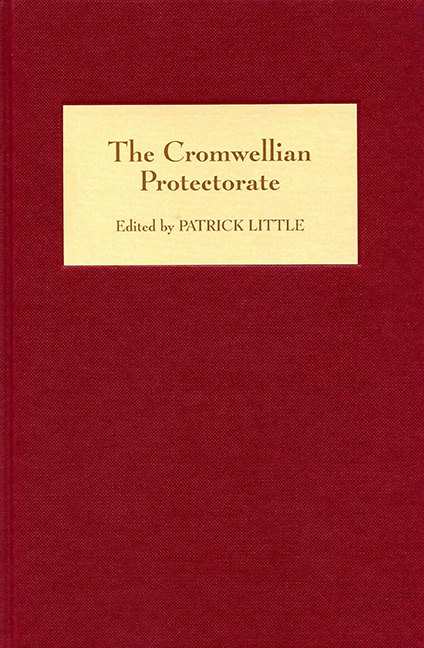Book contents
- Frontmatter
- Contents
- List of Illustrations
- Preface
- Notes on Contributors
- Abbreviations
- 1 Introduction
- 2 Oliver Cromwell and the Protectorate Parliaments
- 3 The Protector Humbled: Richard Cromwell and the Constitution
- 4 Cromwellian Style: The Architectural Trappings of the Protectorate Regime
- 5 Oliver Cromwell and the Council
- 6 ‘To Create a Little World out of Chaos’: The Protectoral Ordinances of 1653–1654 Reconsidered
- 7 The Irish and Scottish Councils and the Dislocation of the Protectoral Union
- 8 ‘This Murmuring and Unthankful Peevish Land’: Wales and the Protectorate
- 9 Cromwellian Towns in the Severn Basin: A Contribution to Cis-Atlantic History?
- 10 Policing the Cromwellian Church: The Activities of the County Ejection Committees, 1654–1659
- Index
7 - The Irish and Scottish Councils and the Dislocation of the Protectoral Union
Published online by Cambridge University Press: 24 October 2017
- Frontmatter
- Contents
- List of Illustrations
- Preface
- Notes on Contributors
- Abbreviations
- 1 Introduction
- 2 Oliver Cromwell and the Protectorate Parliaments
- 3 The Protector Humbled: Richard Cromwell and the Constitution
- 4 Cromwellian Style: The Architectural Trappings of the Protectorate Regime
- 5 Oliver Cromwell and the Council
- 6 ‘To Create a Little World out of Chaos’: The Protectoral Ordinances of 1653–1654 Reconsidered
- 7 The Irish and Scottish Councils and the Dislocation of the Protectoral Union
- 8 ‘This Murmuring and Unthankful Peevish Land’: Wales and the Protectorate
- 9 Cromwellian Towns in the Severn Basin: A Contribution to Cis-Atlantic History?
- 10 Policing the Cromwellian Church: The Activities of the County Ejection Committees, 1654–1659
- Index
Summary
On 28 July 1657, General George Monck anxiously awaited the receipt of ‘a letter to the [Scottish] council concerning the revenues of Scotland, and also concerning the expenses’. He was well aware of the urgency of settling the rickety finances of the civilian and military administration north of the border, and that the English council ‘expect an answer from us’. Yet the revenue orders did not arrive. In a report of 29 July the clerk of the Irish council, Thomas Herbert, was able to solve the mystery:
By the last return of the post save one the council here received his highness's letter concerning the revenue here, with which came another letter under the privy signet, directed to his highness's council in Scotland. And not knowing but the superscription might (through haste or other business) be mistaken, the council here caused it to be opened, and finding that it was intended for Scotland, it was immediately dispatched thither by an express, who … was surprised by a pirate, by whom their boat was sunk, the seamen stripped and put ashore … but the foot post was taken along with them to Ostend, or some other port under the Spaniard.
As it later became apparent, the postman had also been ‘stripped of what he had’ and dumped on the Scottish coast, prompting the authorities there to give him £3 in compensation and a pass to return to Dublin. This incident demonstrates the problems inherent in governing a multiple state: the inefficiency of a centralised bureaucracy, the hazards of government by pen. But it also points to problems specific to the Cromwellian protectorate, especially the interruption to government caused by the Scottish council's need to gain authorisation from Whitehall for administrative reforms, and the extent to which politicians in the English council, either accidentally or deliberately, could cause immeasurable problems for their counterparts in Edinburgh or Dublin.
Government by council lay at the very heart of the protectoral system.
- Type
- Chapter
- Information
- The Cromwellian Protectorate , pp. 127 - 143Publisher: Boydell & BrewerPrint publication year: 2007



